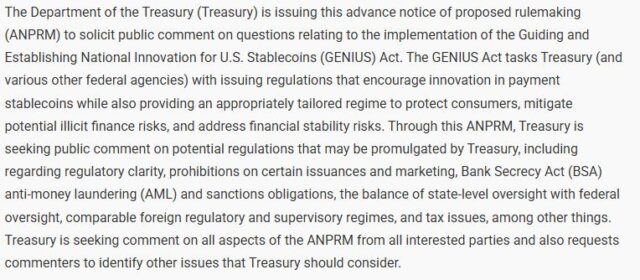Key Takeaways
- The GENIUS Act sets the first federal framework for U.S. stablecoins, requiring licensing, reserve backing, and disclosures.
- Stablecoin issuers must hold 100% reserves in dollars or Treasuries and release monthly transparency reports.
- Only Permitted Payment Stablecoin Issuers (PPSIs) may legally issue stablecoins in the U.S. market.
- Issuers must follow strict AML, risk management, and disclosure standards to protect investors.
- Foreign issuers gain access only if their regulatory regimes meet U.S. comparability tests.
Understanding the GENIUS Act Crypto Regulations 2025
The GENIUS Act crypto regulations 2025—formally called the Guiding and Establishing National Innovation for U.S. Stablecoins Act—became law in July 2025. Unlike previous fragmented state rules, this law creates the first national framework for stablecoins. Consequently, investors and issuers must now operate within unified federal guardrails.
The Act requires issuers to maintain complete reserve backing, publish transparent reports, and obtain approval as a Permitted Payment Stablecoin Issuer. With these standards, lawmakers aim to protect investors, stabilize markets, and prevent systemic risks.
Stablecoin Compliance 2025 – Key Provisions
Reserve Backing and Transparency Rules
Issuers must back every stablecoin with 1-to-1 dollar equivalents in high-quality assets such as U.S. Treasuries or cash. Moreover, they must keep reserves in bankruptcy-protected accounts and disclose monthly reports to the public. These disclosures include asset breakdowns, liquidity measures, and independent audit certifications.
Licensing for Issuers
Only approved PPSIs can issue stablecoins in the U.S. Financial institutions, federally chartered non-banks, and certified state issuers may qualify. Meanwhile, foreign issuers gain access if their home countries enforce rules judged “substantially similar” to U.S. standards.
Risk Management and AML Compliance
Issuers cannot ignore operational risk. The Act mandates procedures for liquidity stress, interest-rate exposure, and cybersecurity safeguards. In addition, firms must follow strict AML and sanctions laws, perform due diligence, and maintain customer identification systems. Regulators want to minimize both systemic risk and illicit finance.

Impacts on Investors and Businesses
Stronger Protections for Holders
Investors gain clearer protections under the new law. Reserves must remain transparent, and consumers receive priority claims if issuers collapse. Furthermore, companies cannot mislead users with claims that stablecoins are legal tender or government insured. These safeguards reduce fraud risks and increase market trust.
Costs and Adjustments for Issuers
While protections strengthen, compliance brings costs. Issuers must pay for audits, reporting systems, and licensing applications. Some smaller projects may close or restructure. Nevertheless, the long-term result could favor serious players who commit to transparency.
Implementation Challenges and Global Implications
Transition Timeline
The GENIUS Act takes effect in January 2027 or 120 days after regulators finalize detailed rules—whichever comes first. During this transition, investors must track Treasury, OCC, and Federal Reserve announcements. Agencies will release guidance that clarifies practical obligations.
International Alignment
Global differences add complexity. European Union rules under MiCA diverge from the U.S. framework, which may complicate cross-border stablecoin operations. However, foreign issuers that adapt to U.S. comparability standards may still serve American users. Investors should watch how global regulators coordinate.
Financial Market Dynamics
Traditional banks remain cautious. Some worry stablecoins could drain deposits, while others explore partnerships. The ultimate effect will depend on how quickly regulators enforce consistent standards. Investors who monitor market sentiment may spot opportunities before adoption accelerates.
Investor Guide to Crypto Laws – Actionable Steps
Research Issuers Carefully
- Confirm that a stablecoin issuer holds PPSI status or foreign equivalence approval.
- Review published reserve disclosures and independent audit results before investing.
- Avoid projects with algorithmic pegs or unverifiable collateral.
Adjust Portfolio Strategy
- Diversify across multiple compliant stablecoins to reduce issuer risk.
- Factor compliance progress into investment decisions—noncompliant coins may lose U.S. market access.
- Watch how exchanges adapt, since delistings or trading restrictions could affect liquidity.
Stay Engaged with Policy Updates
- Monitor Treasury and OCC announcements regarding implementation.
- Participate in public comment processes where investors can voice concerns.
- Track international developments that might affect global stablecoin interoperability.
Summary
The GENIUS Act crypto regulations 2025 reshapes how investors and businesses interact with stablecoins in America. By enforcing full reserve backing, issuer licensing, and rigorous compliance, lawmakers seek to build safer digital asset markets.
For investors, the law offers stronger safeguards but also requires closer due diligence. With transition deadlines approaching, preparation becomes the smartest strategy. As stablecoin compliance 2025 matures, investors who adapt early will likely benefit the most.
Read Also: Why Web 3.0 is the Future of the Internet: Decentralized, Secure, and User-Centric
Disclaimer!! The information provided by CryptopianNews is for educational and informational purposes only. It should not be considered financial or investment advice. Cryptocurrency markets are highly volatile and speculative, and investing in them carries inherent risks. Readers are advised to conduct their own research and consult with a qualified financial advisor before making any investment decisions.
- Unpacking the Forces Driving the 2025 Crypto Rally - November 16, 2025
- Are 4-Year Bitcoin Market Cycles Dead? Bitwise CEO Explains New Market Structure - November 15, 2025
- Bitcoin Bubble Analysis: Understanding the Diaman Ratio Indicator - November 13, 2025

